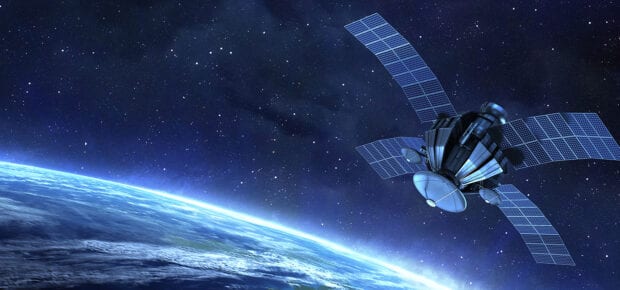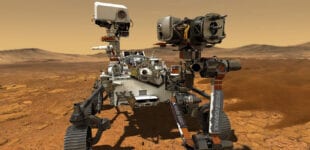August 13, 2020
Now that humans are beginning to turn the dream of Mars and space exploration into a reality through the recently launched Perseverance Mars Rover, cloud computing is an essential technology that will help us understand and process data in real-time through video footage and satellite imagery.
According to IEEE Senior Member Claudio Sacchi and IEEE Fellow Marina Ruggieri, who are contributors to the IEEE Aerospace and Electronics Systems Society’s Glue Technologies for Space Systems Technical Panel, “space exploration calls for brave human and robotized travelers that need to be equipped with the most important tool: knowledge. Data is the means to provide human and robotized travelers the knowledge they need to fulfill at best their mission. An infrastructure that integrates terrestrial and space components is needed to provide Cloud data in the most effective way.”
Much like we use the internet to look up how-to videos or articles when things break around our houses, astronauts are sometimes put in situations where they have to quickly learn, process data or even reboot and restart a computer on a spacecraft in a specific order. This quick access to information can mean life or death and is crucial to keeping fellow astronauts and the space shuttle safe.
Cloud computing uses the internet to quickly access, study and read data over a shared server. This type of technology is crucial for space exploration where we are sending robots (and maybe one day humans) further and further away from Earth and its range of satellites from which it can take days to retrieve data.
“Enabling astronauts to have information readily available at their fingertips is extremely important, and could make the difference between a mission succeeding or failing,” reiterates IEEE Senior Member Alexander Wyglinski.
Conceptually, the cloud that we use to store and exchange information across a connected device and network is no different than the one that could potentially be utilized in space. But Wyglinski explains that the difference is, “with respect to the distances between those devices and the physical challenges they introduce.”
“If you have a space cloud that connects devices on the Moon, orbiting the Moon, enroute to Mars, on the Martian surface, on Earth and a deep space probe around Jupiter, we are talking about a very challenging network since the information on each of these devices will physically need to travel very long distances to get to another device,” says Wyglinski.
In order to see the space cloud succeed, technologists must get innovative on how to efficiently transmit and store data collected from space probes and spacecraft.
“Right now, everything is sent back to Earth for storage and processing; this approach needs to change to enable more cost-effective deep space exploration,” says IEEE Fellow Karen Panetta. “Transmission also incurs in high-power usage, which in space typically is supplied via solar panels, which must be recharged more frequently as the workload increases. A space cloud would provide more efficient storage and transmission methods, so that power consumption would be reduced.”
Panetta explains that AI will be instrumental for reducing power consumption because it “will be able to do intelligent analysis and capture expert knowledge to answer research questions.”
AI’s heavy-lifting reasoning means we might one day rely on the technology to answer our most inquisitive questions such as, “are there signs of life?”
Cloud computing is crucial for space exploration because this format is the future of communication. We look forward to the opportunities the space cloud will offer as technologists continue to develop and understand this new way of sharing and understanding data terrestrially.





 Meaningful Momentum or Running in Place?
Meaningful Momentum or Running in Place? AI Through Our Ages
AI Through Our Ages Liquid Infrastructure: Our Planet's Most Precious Resource
Liquid Infrastructure: Our Planet's Most Precious Resource The Impact of Technology in 2025
The Impact of Technology in 2025 Quantum and AI: Safeguards or Threats to Cybersecurity?
Quantum and AI: Safeguards or Threats to Cybersecurity? Why AI Can't Live Without Us
Why AI Can't Live Without Us Bits, Bytes, Buildings and Bridges: Digital-Driven Infrastructure
Bits, Bytes, Buildings and Bridges: Digital-Driven Infrastructure Impact of Technology in 2024
Impact of Technology in 2024 Emerging AI Cybersecurity Challenges and Solutions
Emerging AI Cybersecurity Challenges and Solutions The Skies are Unlimited
The Skies are Unlimited Smart Cities 2030: How Tech is Reshaping Urbanscapes
Smart Cities 2030: How Tech is Reshaping Urbanscapes Impact of Technology 2023
Impact of Technology 2023 Cybersecurity for Life-Changing Innovations
Cybersecurity for Life-Changing Innovations Smarter Wearables Healthier Life
Smarter Wearables Healthier Life Infrastructure In Motion
Infrastructure In Motion The Impact of Tech in 2022 and Beyond
The Impact of Tech in 2022 and Beyond Cybersecurity, Technology and Protecting Our World
Cybersecurity, Technology and Protecting Our World How Technology Helps us Understand Our Health and Wellness
How Technology Helps us Understand Our Health and Wellness The Resilience of Humanity
The Resilience of Humanity Harnessing and Sustaining our Natural Resources
Harnessing and Sustaining our Natural Resources Creating Healthy Spaces Through Technology
Creating Healthy Spaces Through Technology Exceptional Infrastructure Challenges, Technology and Humanity
Exceptional Infrastructure Challenges, Technology and Humanity The Global Impact of IEEE's 802 Standards
The Global Impact of IEEE's 802 Standards Scenes of our Cyber Lives: The Security Threats and Technology Solutions Protecting Us
Scenes of our Cyber Lives: The Security Threats and Technology Solutions Protecting Us How Millennial Parents are Embracing Health and Wellness Technologies for Their Generation Alpha Kids
How Millennial Parents are Embracing Health and Wellness Technologies for Their Generation Alpha Kids Space Exploration, Technology and Our Lives
Space Exploration, Technology and Our Lives Global Innovation and the Environment
Global Innovation and the Environment How Technology, Privacy and Security are Changing Each Other (And Us)
How Technology, Privacy and Security are Changing Each Other (And Us) Find us in booth 31506, LVCC South Hall 3 and experience the Technology Moon Walk
Find us in booth 31506, LVCC South Hall 3 and experience the Technology Moon Walk Virtual and Mixed Reality
Virtual and Mixed Reality How Robots are Improving our Health
How Robots are Improving our Health IEEE Experts and the Robots They are Teaching
IEEE Experts and the Robots They are Teaching See how millennial parents around the world see AI impacting the lives of their tech-infused offspring
See how millennial parents around the world see AI impacting the lives of their tech-infused offspring Take the journey from farm to table and learn how IoT will help us reach the rising demand for food production
Take the journey from farm to table and learn how IoT will help us reach the rising demand for food production Watch technical experts discuss the latest cyber threats
Watch technical experts discuss the latest cyber threats Explore how researchers, teachers, explorers, healthcare and medical professionals use immersive technologies
Explore how researchers, teachers, explorers, healthcare and medical professionals use immersive technologies Follow the timeline to see how Generation AI will be impacted by technology
Follow the timeline to see how Generation AI will be impacted by technology Learn how your IoT data can be used by experiencing a day in a connected life
Learn how your IoT data can be used by experiencing a day in a connected life Listen to technical experts discuss the biggest security threats today
Listen to technical experts discuss the biggest security threats today See how tech has influenced and evolved with the Games
See how tech has influenced and evolved with the Games Enter our virtual home to explore the IoT (Internet of Things) technologies
Enter our virtual home to explore the IoT (Internet of Things) technologies Explore an interactive map showcasing exciting innovations in robotics
Explore an interactive map showcasing exciting innovations in robotics Interactively explore A.I. in recent Hollywood movies
Interactively explore A.I. in recent Hollywood movies Get immersed in technologies that will improve patients' lives
Get immersed in technologies that will improve patients' lives